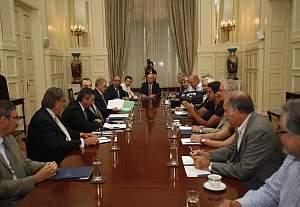 Mr. Lambrinidis: Good morning to everyone, and welcome. I’m happy that you responded to our invitation to be here at the Foreign Ministry today so that we can discuss the extremely important ‘day after’ in Libya and your participation in that.
Mr. Lambrinidis: Good morning to everyone, and welcome. I’m happy that you responded to our invitation to be here at the Foreign Ministry today so that we can discuss the extremely important ‘day after’ in Libya and your participation in that.
As you know, our country has pursued a leading role of late in the developments in Libya, both on the level of implementing UN resolutions, as well as on the level – and this is of particular importance – of facing the day after, which is the big issue. Because, as we have said from the very beginning, military operations alone won’t resolve the issue. We are among the first countries – and I think this is of particular interest to you – to have established diplomatic contact in Benghazi: with Greek diplomats who have been in contact for months now with the National Transitional Council. And we are prepared, as soon as conditions allow, to immediately re-open our Tripoli embassy, and I think this is very important for your presence there.
I will brief the cabinet today on our Libya policy. The Prime Minister and I will be in Paris tomorrow at the meeting of Friends, as the Contact Group is now called, and we will naturally pursue the continuation of our leading participation, particularly now on humanitarian and development issues.
As Libya enters the next phase, we must prepare intensively for this. Greece must and will have a dynamic presence. When the hostilities stop. They haven’t stopped yet. If you read the newspapers, there is a sense that the hostilities have come to an end. They haven’t. There is still a war going on in Libya, in Tripoli. There are a lot of tensions in hostilities in other areas as well. But our assessment is that all this will obviously end – we are obviously moving on with a transition.
The reconstruction and development of Libya’s economy will be vital to the country and stability in the region. This development will allow for the building of democratic institutions, and we are looking at this at the same time, because this the real wager that needs to be won, and it is also something Greece can assist with.
In the development sector, your contribution is decisive. You represent enterprises that have been in Libya for some time now, you have worked there, you know Libya. Through your activities from here on in, you can become factors for Libya’s growth, while also naturally supporting the Greek presence there, giving tangible proof of the close ties between the Greek and Libyan peoples.
And that is why I wanted us to have this meeting. I wanted to hear from you about the issues each of you expects to be facing, or ideas or proposals you might have to make our presence there stronger. It goes without saying that the Foreign Ministry – to the extent of its role – with pursue the provision of undivided support for your presence, and that is the basic message I want to pass on to you.
Now, finally, I don’t need to say much by way of introduction about Deputy Foreign Minister Dimitris Dollis, who is sitting here on my right. You met him when, together with Ministry personnel, he worked to evacuate and repatriate dozens of our fellow citizens and your associates from Libya. He is participating in our meeting today in his new capacity as Deputy Minister for economic diplomacy issues, and I would ask you, Dimitris, to say a few words as well.
Thank you very much for coming, and the floor is yours.
August 31, 2011


